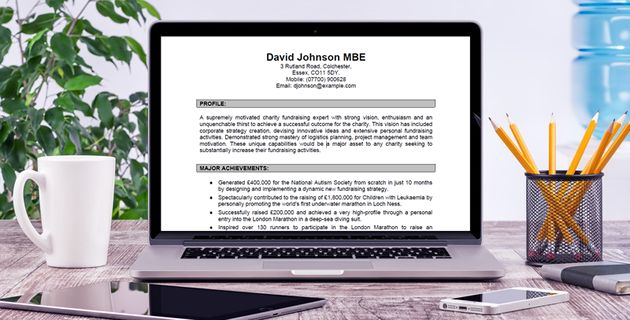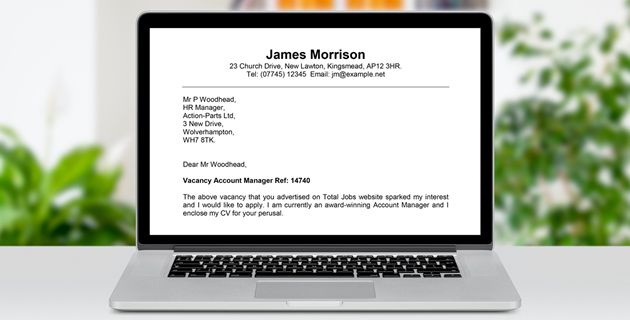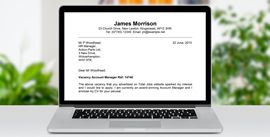How to Dramatically Improve Your CV and Win More Interviews

Share this article by clicking on the buttons below:
Below, you'll learn about 10 of the most critical improvements that you can make to your CV.
Implement these today if you want to get employers to take notice of your CV and invite you to those all-important job interviews.
Remember you have just one chance to impress an employer with your CV before they move on to the next, so make sure your CV is the best to ensure you win the maximum number of interviews.
1. Your CV Must Sell You to an Employer in Just 30 Seconds
First impressions really do count, if your CV doesn't grab an employer's attention in the first 20 to 30 seconds of them starting to read your CV, then your chances of obtaining an interview are significantly reduced.
An employer may have 100, 500 or more CVs to look through for each job vacancy and only an hour in which to make their selection of who they are going to interview. They have to therefore make a split decision about whether to interview or reject a candidate almost instantly.
Have a look at your own CV from an employer's perspective: What do you read and take in within the first 30 seconds? Be honest, would you give yourself an interview or just move on to the next CV?
Now think about what you need to change: Do you need to change the order of the information? Should you change the actual content itself to get across better exactly what you have to offer?
Is the language you've used throughout your CV engaging enough to hook an employer? Your whole CV needs to be written in a positive and persuasive manner and make employers want to invite you for an interview.
2. The Profile Must Capture an Employer's Attention
Most people have a profile (or summary) section at the top of page one of their CV. Some people use it as a summary of all the jobs that they've ever had, whilst others use the profile as a place to list all their key skills, sometimes taking up the first half a page of their CV.
In our opinion, your profile should be a summary of all your key skills, experience and talents that are relevant to the job that you want to do next. Keep it short and sweet, no one wants to read a half-page profile, it just needs to whet the appetite of employers and recruiters.
Don't over exaggerate what you can do or use glib phrases that you can't substantiate with facts and figures later in your CV. If your profile makes wild claims that you can't prove in the rest of your CV, then employers and recruiters will just completely discount your profile and your whole CV.
There are so many CVs where the profile sounds great, but the rest of the CV is such a let down that you just assume that the Profile was made up or copied from someone else.
In our how to write a profile for your CV you'll discover how to make sure your CV stands out, ensuring that employers will want to meet you.
3. Your Achievements and Results Must Make You Stand Out
It's crucially important to showcase your achievements and results on your CV, as these can be a key differentiator, whether you're a new graduate or a senior executive.
Your achievements must show how you can make a difference, making employers / recruiters take notice of your CV. Tell them why they should interview you, rather than the other 100 or 500 applicants.
With so much competition, your best achievements must be immediately obvious and clearly signposted. A separate key / major achievements section near the top of page 1 of your CV will instantly grab the attention of both employers and recruiters.
Highlight achievements and results in every section of your CV, but only include those that are relevant to the job you want to do next.
In our how to write achievements on your CV, you'll find out how to create achievements that entice employers to invite you to those all-important job interviews.
4. Improve the Structure and Visual Layout of Your CV
The structure and visual layout of your CV are very important. Even though the wording you use may be correct, if people can't find the information they want quickly enough, then they will move on to the next CV.
It is usually best to use a conventional layout, breaking your CV down into a number of separate sections. Typically, you might have section headings such as Profile, Major Achievements, Career History (or Experience), Qualifications, etc. Using section headings makes it much easier for the reader to find the information they want quickly.
Don't use fancy borders or graphics, as they can detract from your actual CV's content. They can also dramatically increase file size, causing problems when emailing or printing your CV. Job sites normally limit file size when you're uploading your CV, so it could be truncated or become incomprehensible.
Multi-column CVs can look visually attractive, but they make it far more difficult for the reader to quickly access the information on your CV. Applicant tracking systems used by both employers and recruiters also have difficulty distinguishing between columns and different blocks of text, so your CV may become unreadable.
Some people put bar charts listing their skills and awarding themselves 5 stars. No employer or recruiter will take any notice of you awarding yourself 5 stars, so leave these off your CV.
Our CV Examples will show you how to correctly layout your CV and make both employers and recruiters take notice of your CV.
5. Keep Your CV as Short as Possible
It is usually best to try to keep your CV to two pages, unless you are specifically asked for a longer version. Employers don't want to know your whole life history, just enough to decide whether they should interview you or not.
Remember, employers usually only spend 20 to 30 seconds reading each CV during their first pass through a pile of CVs, so they simply don't have time to read all of a 10-page CV.
If your CV is longer than two pages, then try to cut it down. Start by removing superfluous or irrelevant content. Look at every line of your CV and ask yourself whether this is relevant to what you want to do next, if it isn't then delete it.
Once you've removed the unnecessary content, you can then condense down the remaining information to fit on two pages. Make sure you focus on the jobs, experience, skills and achievements that are relevant to what you want to do next.
6. Too Much Detail vs Too Little Information?
Getting the balance right in your CV is very difficult. If you have included too much detail, then an employer may not be able to find the information they need or they may struggle to gain a full understanding of your work experience and capabilities quickly, so they'll simply reject your CV.
Whilst including too little or the wrong sort of information on your CV will mean that an employer won't know whether you have the relevant experience and skills to do the job and they'll just move on to the next CV in the pile.
You need to identify exactly what employers are looking for, in terms of the skills, experience, qualifications and training, then ensure you have included this information clearly within the relevant sections of your CV.
You also need to ensure that you've included enough detail about each of your jobs, so that your next prospective employer can judge what relevant experience you have gained.
It can be difficult to judge yourself whether you have included too much detail or too little information, so always ask employers and recruiters what they think when they read through your CV.
7. Target the Specific Job You Are Applying For
When you are improving your CV, you need to make sure that your whole CV is consistent and focuses on what you want to do next. If your CV is disjointed then this will give a bad impression and may put an employer off.
Look carefully at each section of your CV, ensure you focus on the skills, experience and achievements that most closely relate to the job that you are targeting. Don't include irrelevant information that doesn't relate to what you want to do next.
You may need to produce more than one CV, if you are targeting a number of different types of jobs / sectors, as you may need to showcase different skills, experience and achievements that are relevant to a particular job / sector.
For each application you make, you need to look afresh at your CV and make changes to your CV, so that it closely matches the job that you are applying for. The closer your CV matches an employer's requirements, the more likely you are to be offered an interview.

8. Write a Knockout Cover Letter to Introduce Your CV
Not strictly part of writing your CV, but a cover letter is still vitally important if you want to get your CV noticed and read in the first place.
If you're emailing your CV directly to an employer / recruiter, then the email itself plays the same role as a traditional cover letter. Whilst if you click on the 'Apply' button on a job board, there is normally an opportunity to either attach a cover letter or type your comments / additional information into a box.
So many people fail to include a cover letter and miss a golden opportunity to truly impress an employer; don't be one of these people. Make your letter specific to the job that you're applying for. No one wants to read a generic letter that you've clearly sent to every job you've applied for.
Read the job advert through several times, noting down exactly what they require, in terms of skills, experience, qualifications, training, etc.
Focus your letter on what specifically you can offer that they asked for in the job advert. Tell them why you are right for the job and how you can make a difference and add value if they employ you.
Your cover letter must immediately grab the readers' attention, making your application really stand out.
Our how to write a perfect cover letter will teach you how to produce a distinctive cover letter for a number of different types of applications.
9. Check for Spelling and Grammar Errors
A nationwide survey by the Recruitment & Employment Confederation found that half of all CVs contained spelling and grammar errors. A survey by Hertfordshire University found that three-quarters of employers would be put off by poor spelling or grammar in a candidate's CV.
This clearly shows that any errors in your CV can detract from an otherwise good CV and make you look lazy or careless - not the sort of qualities you want to portray to an employer. This may give an employer just the excuse they need to reject your CV.
Double and triple check your spelling and grammar, carefully re-reading your CV several times, checking for errors and do run the built-in spelling and grammar checker.
Also get several people to check your CV too, because a spelling and grammar checker won't find every error and they're never 100% accurate and can encourage you to make erroneous changes!
10. Sell, Sell, Sell
Your CV must be your sales brochure to employers and recruiters, convincing them to interview you.
Remember you could be facing intense competition, and have to beat 100 or 500 applicants.
All employers want to know from your CV is: Can you do the job, and will you do it better than the other applicants?
You must therefore highlight the benefits of employing you, using words and phrases throughout your CV that sell your key skills, experience and achievements to an employer and entice them to want to meet you.
Always be confident and positive. Don't be scared to tell employers and recruiters about how good you really are. But be careful that you don't oversell yourself.
If you feel slightly embarrassed about how good you sound on your CV, then it's probably about right, as most people severely undersell themselves.
Getting the balance right can be very difficult, so always ask recruiters and employers what they think of your CV and how it compares with the other CVs that they receive.
Do you want to share this article?
Share this article by clicking on the buttons below:
Articles on CV Writing
- CV Examples
- How to write a great profile for your CV
- How to write powerful achievements on your CV
- Make your career history stand out on your CV
- Making the most of qualifications and training courses on your CV
- Should personal details and interests be included on your CV?
- Ten things to leave out of your CV
- Ten more things to leave out of your CV






